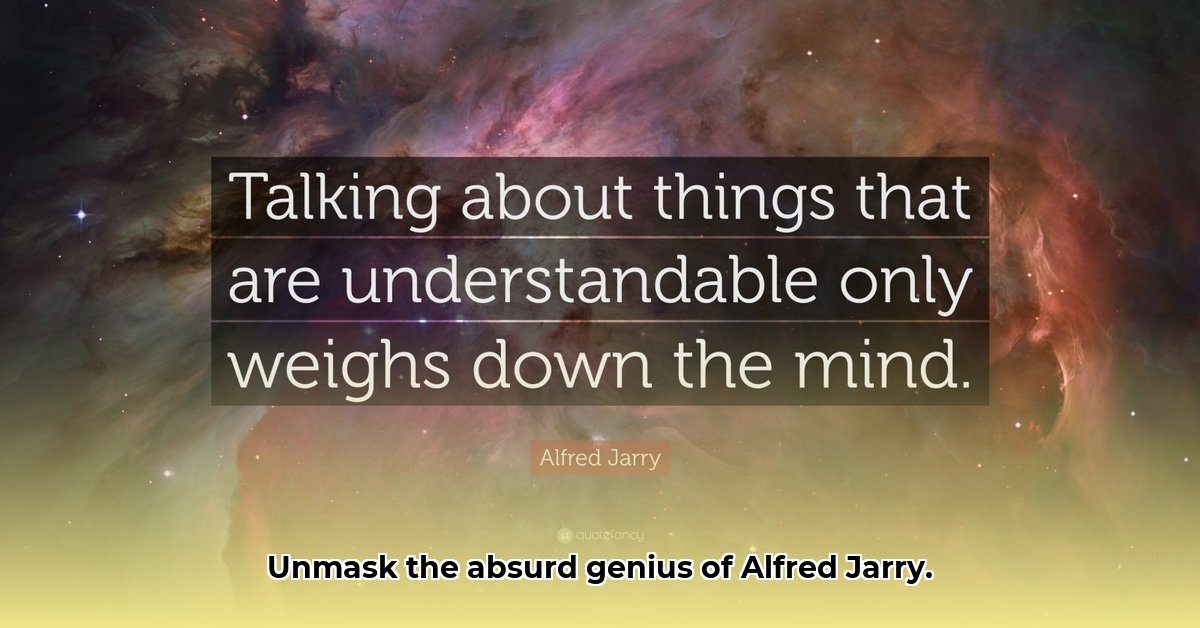
Alfred Jarry. The very name whispers of chaotic brilliance, a whirlwind of theatrical mayhem and philosophical absurdity. He wasn't your average, respectable artist; he was a maverick, a rebel who shook the foundations of French theatre and left behind a unique brand of philosophical nonsense. This isn't just a biography; it's a journey into the mind of a man whose life mirrored the unpredictable nature of his art – a story that continues to resonate even today. His impact on modern theatre, literature, and even philosophy is undeniable, making him a key figure in understanding the development of avant-garde movements.
The Explosive Debut of Ubu Roi
Imagine a play so outrageous, so shocking, it sparked a riot at its premiere. That was the reception of Jarry’s Ubu Roi in 1896 – a theatrical bombshell that rocked Parisian stages. Forget elegant language and refined gestures; Ubu Roi was a slap in the face of conventional theatre, a grotesque puppet show overflowing with scatological humour and excessive violence. Picture Shakespeare on a bender, fuelled by cheap wine and malicious intent. King Ubu, the play's protagonist, is a crude, power-hungry tyrant, a caricature of political corruption and human depravity. The initial stunned silence of the audience quickly erupted into a cacophony of outrage and laughter, with some fleeing in disgust whilst others were captivated by the sheer audacity of it all. Was it high art or lowbrow entertainment? The debate continues, but its impact on theatrical history is indisputable. Ubu Roi irrevocably altered the landscape of theatre, paving the way for the Theatre of the Absurd and influencing generations of artists. It didn't just challenge conventions; it annihilated them. Did it fundamentally change our understanding of what constitutes "theatre"? Surely this is worth considering.
A Life Lived on the Edge
Jarry's life was as unconventional and chaotic as his most infamous work. He lived in near-constant poverty, battling alcoholism and a penchant for shocking behaviour. Some might label this self-destructive; others might see it as integral to his creative genius. His life, filled with tumultuous relationships and financial hardship, provided a unique perspective – an outsider's view that fueled his artistic vision. He embraced the fringes of society, finding inspiration in the absurd and unconventional. His turbulent personal life likely played a pivotal role in shaping his artistic vision, creating work that was both deeply disturbing and strangely compelling. This doesn't imply emulation of his lifestyle, but his experience highlights how unconventional journeys can inspire unique artistic expression.
Pataphysics: The Science of Imaginary Solutions
Beyond his theatrical masterpiece, Jarry bequeathed a legacy of philosophical anarchy: pataphysics. Defining it simply is challenging; some describe it as the science of imaginary solutions, exploring the illogical and nonsensical. Others see it as a playful rebellion against rigid systems of thought. Its deliberate vagueness and resistance to easy categorisation contribute to its enduring appeal. Pataphysics is a form of intellectual anarchy, a playful challenge to conventional ways of thinking and understanding. It suggests reality is far more complex and absurd than our attempts to categorize and rationalize it. Its influence is visible in various 20th-century art forms, particularly amongst the Dadaists and Surrealists. Remarkably, this seemingly obscure philosophy continues to resonate with artists and thinkers today, providing a unique lens through which to examine the world's inherent absurdity. It likely holds unexplored implications for creativity and our perception of reality, continuing to be explored thoroughly by scholars.
Jarry's Enduring Shadow
Jarry's influence transcends time and genre. His work deeply resonated with the Dadaists and Surrealists, artists who embraced the irrational and nonsensical. The grotesque imagery of his plays is reflected in Picasso's early works, suggesting a direct line of artistic rebellion. His impact is still felt today. Theatre companies regularly revive his plays, finding new ways to interpret his subversive, irreverent vision. His writings continue to inspire creatives, reminding us that humour and absurdity are powerful tools for social critique. This far-reaching impact is a testament to his enduring genius and ability to challenge and inspire across generations. Is this not a testament to the potency of his artistic vision?
The Ongoing Discussion and Future Directions
Jarry's legacy isn't without its critics. Some find his excessive use of scatological humor offensive; others question the depth of his work. These criticisms, however, don’t diminish his importance. They highlight the complexity surrounding his work, adding layers of intrigue and stimulating ongoing debate. Future generations may interpret his work differently, further enriching the discussion surrounding his lasting impact and influence. This certainly warrants further research and investigation. What aspects of Jarry's work will resonate most profoundly with future generations?
This exploration of Alfred Jarry's life and work serves as a starting point for further investigation into his impact on the 20th century and beyond. The man, his work and his legacy remain as provocative and compelling as ever.